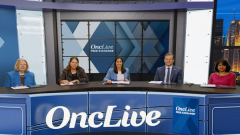
Ongoing Trials on Maintenance Therapy in Recurrent Ovarian Cancer
A panel of experts on ovarian cancer review ongoing trials on maintenance therapies for recurrent ovarian cancer.
Episodes in this series

Transcript:
Ritu Salani, MD, MBA: Before we move from recurrent ovarian cancer maintenance, there are a couple of exciting trials that are ongoing right now. I’d love to hear your perspective on the role of that maintenance and upgrade maintenance in this setting. I’ll open it up to the panel.
Shannon N. Westin, MD, MPH, FACOG: I think the study designs are perfect now that we’re moving PARP, which has been our established maintenance strategy. In the second line, we do have an opportunity. Certainly, we can still utilize bevacizumab in that space, but exploring other targeted therapies makes a lot of sense. So, from the mirvetuximab standpoint, we have the GLORIOSA trial, which is for patients who have had benefit from their second line, platinum-based therapy, and received bevacizumab and then they’re [randomly assigned] to either continuing the bevacizumab alone or adding mirvetuximab. This is selected by folate receptor [FR] α positivity. We have seen that combination of [mirvetuximab] and [bevacizumab], [which] have a lot of activity in the platinum-resistant setting. So there’s certainly excitement around that as a maintenance strategy.
Bhavana Pothuri, MD: I think the other thing that is interesting about the combination is that perhaps you can even get efficacy in the lower FR α expressor. So I think that’s something that’s really interesting as well.
Ursula A. Matulonis, MD: We have a trial [that is] about to open. I call it the Godfrey trials. It's basically Bhava looking at lower levels of expression of FR α and adding mirvetuximab to carbo platinum, then continuing mirvetuximab as maintenance treatment in that 25% or higher.
Ritu Salani, MD, MBA: That's Study 420, I think it’s really interesting. Then there’s also the UP-NEXT trial. Anybody have that open?
Bhavana Pothuri, MD: We have that open. I think really seeing if we can use the different biomarkers and capitalize on the different tumors is important. So that one targets NaPi2b, and it's looking at UpRi [upifitamab rilsodotin] vs placebo after they complete their standard chemotherapy, for platinum-sensitive recurrence. So it’s exciting to have these trials to offer patients, and as, Shannon said, now that PARPs are here and they’re going to be used in the front line. So let’s look at the second line and see how we can improve outcomes in those patients. I think both of these trials are set up perfectly.
The other trial, GLORIOSA, includes patients who receive bevacizumab. So if you started with bevacizumab, then you can screen these patients for GLORIOSA, and if they didn’t, then they have another option, which is the UP-NEXT trial.
Ritu Salani, MD, MBA: We have [bevacizumab], we have UpRi, and we have [mirvetuximab] kind of being a plus or minus, [bevacizumab] being developed. This is really an exciting time, but hopefully there will be more stuff on the horizon soon.
Bhavana Pothuri, MD: I think with the plethora of ADCs [antibody-drug conjugates] that are surfacing, there will definitely be more.
Transcript edited for clarity.







































